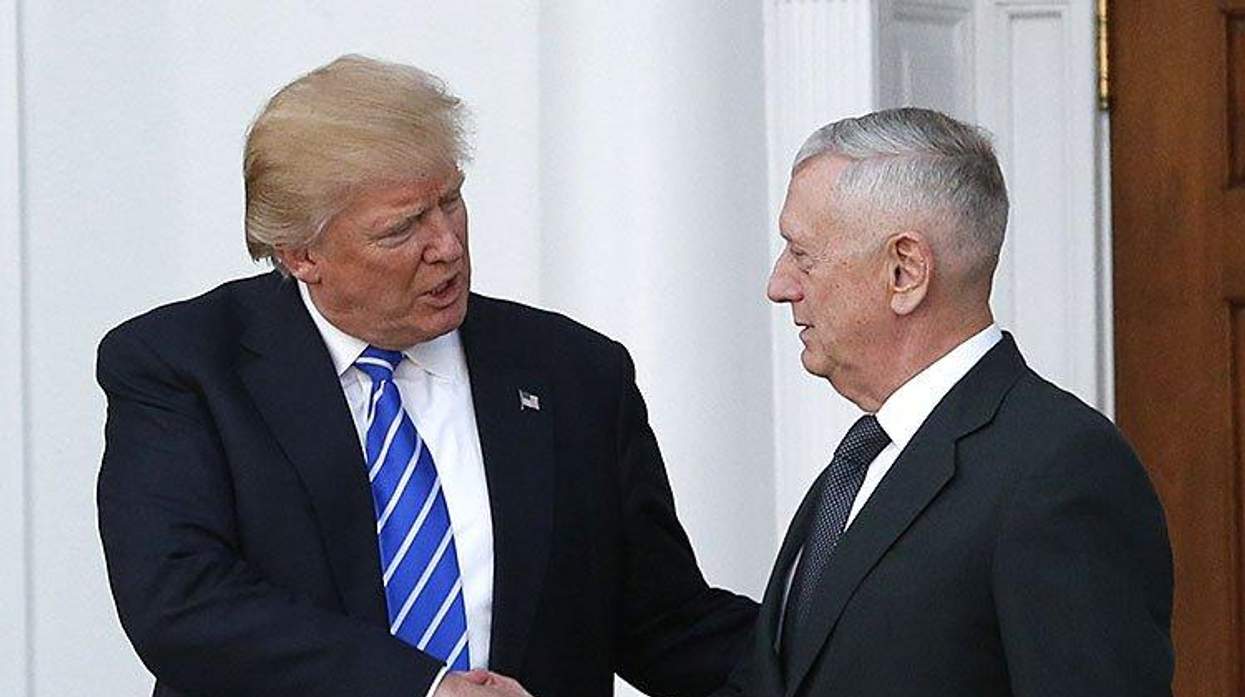The Department of Defense will delay the enlistment of new transgender service members in the armed forces for six months, Defense Secretary James Mattis announced Friday.
"We will use this additional time to evaluate more carefully the impact of such accessions on readiness and lethality," Mattis wrote in a memo that was obtained by several major news outlets, including CNN and the Associated Press. A Pentagon official said Mattis made the decision Friday.
The enlistment of new trans troops was supposed to begin in July. Ash Carter, Defense secretary under President Obama, announced a year ago today that the ban on trans troops was lifted, allowing those already serving to do so openly without fear of discharge. "But it also gave the Pentagon a year to determine how to begin processing new transgender recruits who want to serve," notes The Washington Post.
Because the ban on service by transgender people was a military policy, not a law passed by Congress, it did not require congressional action to reverse -- unlike the "don't ask, don't tell" law, which required lesbian, gay, and bisexual service members to stay in the closet.
But some military officials and Republicans in Congress have objected strenuously to allowing trans people to serve, even though Carter and other military experts determined that doing so would not undermine the armed forces' readiness. Just this week some congressional Republicans made transphobic arguments, saying many service members would be uncomfortable bunking or showering with a trans person, and one gave an inflated estimate of the additional cost of health care for trans troops.
Advocates for transgender equality denounced today's decision. "This six-month delay is disappointing because it unnecessarily delays the ability of transgender people to be open about their identity when entering the military," said Ashley Broadway-Mack, president of the American Military Partner Association, in a press release. "It has been unequivocally proven that allowing qualified transgender people to serve openly strengthens our military and creates a more inclusive and diverse force. The issue has been thoroughly studied and moving forward with this new recruitment policy is imperative in order for the military to be able to recruit the best talent our nation has to offer."
Mara Keisling, executive director of the National Center for Transgender Equality, released this statement: "The Department of Defense spent over a year intensively studying the integration of transgender people in the military before allowing them to serve openly in June 2016, and it's had over a year since then to observe the results -- namely, that allowing transgender people to serve without fear or lying about who they are is good for military readiness and good for morale. The evidence is already clear: even though thousands of transgender people are already serving openly in the military, the hypothetical problems and concerns some had speculated about have simply not materialized. The military needs to be able to recruit people based on their skills and abilities, regardless of whether they're transgender. Impeding that by prolonging the blanket ban on new transgender service members who are fit and ready to serve is bad policy. This last-minute decision to reverse the Department of Defense's carefully considered plan is harmful, it's not supported by the facts, and it risks telling the thousands of transgender people who are already serving their country -- and the thousands more who have waited for years to join their ranks -- that their service and their sacrifice is not wanted and not valued."
OutServe-SLDN also issued a statement, saying in part, "This delay is a disservice to the transgender community and to our military as a whole. While we cannot now avoid this six-month delay, we expect the full and unequivocal implementation of this accessions policy for transgender individuals at the end of these six-months. We reiterate that the services are prepared for transgender individuals and assert that delays beyond January 2018 will have a negative impact on military readiness -- that we cannot tolerate."
Added Human Rights Campaign national press secretary Stephen Peters, a Marine veteran discharged under "don't ask, don't tell": "Once this important policy is implemented, it will strengthen our military by allowing qualified and talented transgender people to enlist or commission. Each day that passes without the policy in place restricts the armed forces' ability to recruit the best and the brightest, regardless of gender identity. We are disappointed in this needless delay because the thousands of highly trained and qualified transgender service members openly and proudly serving our nation today have proven that what matters is the ability to accomplish the mission, not their gender identity."
Earlier in his career, Mattis had expressed opposition to LGBT troops in general as well as service by women, but during his confirmation hearing as Donald Trump's Defense secretary nominee, he appeared disinclined to roll back any of the progress made under President Obama.




































































Charlie Kirk DID say stoning gay people was the 'perfect law' — and these other heinous quotes